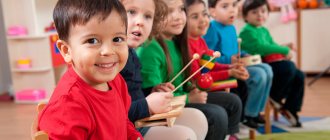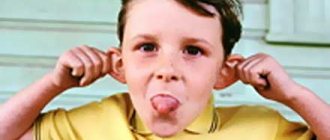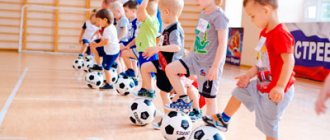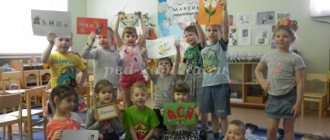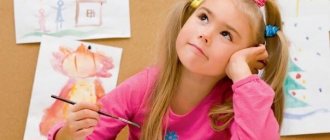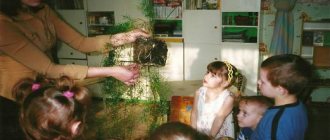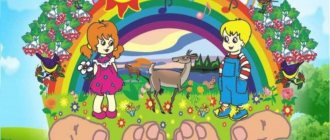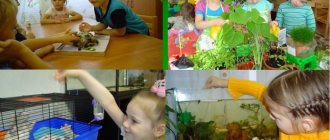Scientific article “Features of economic education of preschool children”
Features of economic education of preschool children
The prerequisites for the economic education of preschoolers are laid in early preschool age. From an early age, a child must be taught to be neat and careful with toys and various objects. At the age of five or six, such work continues and becomes more focused.
In practice, we observe that by the age of six or seven, children have accumulated some experience in energy saving: they know that they need to turn off the water and electricity. Preschoolers notice if someone has not turned off the water after themselves. However, it should be noted that the level of economic development of children by the time they enter school is unequal. This depends not only on the individual characteristics of the children, but also on a number of other circumstances. Educators do not always manage to establish contact with parents. And as a result of unequal educational influences on a preschooler, he develops a different style of behavior in kindergarten and at home. The child often does not understand why it is forbidden to leave the bread crust (at home this is allowed), why it is necessary to save water (at home water flows from the tap while mother is in the kitchen), etc.
Sometimes parents underestimate the role of special economics classes; they say that when their children grow up, they will start saving. That is why children come to school with different levels of economic ideas. Mastering the norms of economics is carried out in various activities of children in kindergarten. They are included in it by adults (conversations, games, activities, work), as well as in everyday life, when, as a result of the analysis of certain actions of individual pupils, ideas about kindness, justice, frugality are clarified, feelings develop, motives of behavior are formed, positive experience accumulates behavior in kindergarten and at home.
The criterion for a person’s economic education, as is known, is his behavior, i.e., the set of actions he performs in familiar or changing conditions. The economic education of a person permeates his emotional and motivational sphere, the development of which largely depends on knowledge, judgments (ideas) about what it means to be economical, thrifty and kind, attentive, polite.
In practice, observing the play activities of preschoolers and analyzing the questions asked, we are faced with the fact that they are interested in very serious problems related to economic content. The most common among them are: “Why are the prices for the same goods different?”, “Why does everyone get different salaries?”, “Can everything be bought with money?”, “What to do when there is no money?”, “Why Mom doesn’t buy toys like other children?” etc. Very often in the speech of children we hear the words: “advertising”, “exchange”, “businessman”, “bank”, etc., the meaning of which many do not know. The reason for the “economic” curiosity of preschoolers lies in the penetration of economics into all spheres of people’s lives and, above all, into the life of the family, where the child at every step is faced with economic problems discussed by members of his family.
As prerequisites for economic upbringing and education, one can highlight previously acquired knowledge in the field of economics, curiosity and keen interest, the presence of an outlook, a high level of conceptual thinking, and the child’s readiness to master economic knowledge. Moreover, the latter should not only be accessible to children, but also correspond to their interests and level of thinking, personality traits necessary in one or another economic activity and manifest themselves in the play and work activities of preschoolers.
According to A.D. Shatova preschoolers should know everything about labor and everything connected with it: production, means of production, means of circulation, simple cooking technologies, making toys, monetary units and their purpose, value and cost, insurance and taxes, various professions, etc. .
Using the entire variety of forms of organizing the educational process will help the teacher make the process of economic education interesting, creative, and accessible to preschoolers.
One of the main forms of organizing economic education for preschool children is the occupation
, often combining mathematics, speech development and the world around us at the same time, the so-called integrated lesson. Classes introduce children to basic economic categories and introduce them to economically feasible behavior. In the process of solving logical and arithmetic problems, children’s interest in acquiring economic knowledge increases and a desire for self-development is observed. Classes broaden their economic horizons, clarify preschoolers’ ideas, introduce them to new prestigious professions, allow them to understand the role of work in a person’s life, the specifics of commodity-money relations and advertising, teach them to spend money wisely, take care of things (toys, clothes, shoes) and natural resources.
In classes to familiarize yourself with the outside world, it is necessary to plan solutions to the problems of economic education. With children, it is important to find out the conditions for caring for nature, natural resources, the environment, flora and fauna.
Children should be taught economics not using the usual traditional methods, but through play, competition, communication with fairy tales, and oral folk art.
To develop efficiency, thriftiness, and ingenuity, you can play the games “Income from waste” (about the use of waste materials in games), “Shop”, “Hairdresser”, “Atelier”, etc.
In applique classes, you can use templates depicting geometric shapes, followed by the task of arranging the shapes on a sheet of paper so that there is as little waste as possible.
Manual labor classes are important components of economic education, because Productive activities represent great opportunities for forming the foundations of economic thinking.
A.V. Beloshistaya points out that the mathematical development of children is, first of all, aimed at their mastering subject-specific (mathematical) content, the formation of cognitive and creative abilities. Mathematics equips a child with the means of rational knowledge of the world. Counting, measuring, and elementary calculations are the methods that a child uses to solve various problems, including economic ones. The use of these methods in cognitive and practical activities stimulates search and opens the path to creativity for the child. Mathematical knowledge can be considered as the basis for the development of elementary economic concepts in older preschoolers. At the same time, familiarization with the economic sphere of reality contributes to the child’s transition from the formal acquisition of mathematical knowledge to their conscious application in a new area.
The pedagogical value of fairy tales as an effective means of cognitive development of a preschooler lies in the possibility of developing knowledge in children, including economic knowledge, in an accessible and entertaining form. Children love to listen to fairy tales, both traditional folk ones, and original ones, and those invented by the teacher for a predetermined purpose. By the way, any familiar fairy tale can be modified, economic situations can be introduced: purchase and sale, payment of labor, cash loan, installment plan, etc. Entertainment, dramatization of economic fairy tales, leisure evenings, competitions, holidays, quizzes are, as a rule, general in nature and are used to consolidate and systematize knowledge, develop economic thinking. Reading fiction helps to highlight the motivations and actions of the characters and characterize their actions, forms the vocabulary of children, and most importantly, it will provide an explanation for many incomprehensible economic phenomena.
E. A. Kurak, L. A. Mikherev recommends, in addition to activities with children, to conduct games
(role-playing, didactic, theatrical) with economic content, reading fiction (“The Fly-Tsokotukha”, “The Three Little Pigs”, “Puss in Boots”, etc.), solving problem situations that arise both in literary works and in real life, modeling economic situations, quizzes, competitions, etc. Thus, solving problem-game situations trains children in the ability to solve practical problems, navigate the surrounding reality, thereby contributing to the formation of economically literate behavior.
T.G. Khanova, N.M. Prokofiev believe that play, being the leading activity of a preschooler, allows a child to become familiar with the world of commodity-money relations, master complex economic categories (price, demand, advertising, credit, business, etc.), and gain and consolidate new knowledge in an entertaining way. In short, independent and creative play makes economics accessible to children. “Advertising games” are interesting, where children are asked to advertise various toys and objects, emphasizing their functionality and attractiveness.
Role-playing games
help make economics more understandable. Thus, by playing the role-playing game “Professions”, children comprehend the meaning of work, reproduce the labor processes of adults and at the same time “learn” economics. In plot-based didactic games, real life situations are simulated: purchase and sale operations, production and marketing of finished products, etc. The combination of educational-game and real-life activities is most effective for preschoolers to master complex economic knowledge.
In the games “Confectionery Factory”, “Studio for Little Beauties”, “Advertising Agency”, “Currency Exchange Office”, “House Construction”, “Meeting Room”, “Supermarket”, etc., the most favorable conditions are created for the development of children’s interest to economic knowledge, a natural environment close to reality, a psychologically age-appropriate communication situation is established.
The process of children communicating with each other and with adults in joint play activities is accompanied by positive emotions, which stimulates their cognitive activity and promotes the development of thinking. The combination of educational games and real activities is most effective for preschoolers to master complex economic concepts.
Children also gain ideas about economics and economic concepts in everyday life, when they go with their parents to the store or to the market. Children see a product, know its price, see how their parents pay at the checkout or with the seller, hear the words “cheap”, “expensive”, “money”, “price”, “earn money”.
Thus, at the present stage it is necessary to increase the level of economic ideas of children of senior preschool age, therefore it is important to begin the formation of an economic culture from an early age, in order to increase the general cognitive activity of children, fostering such qualities as frugality, independence, business activity, and the ability to defend one’s point of view .
reference Information
Documents • Laws • Notices • Document approvals • Contracts • Requests for proposals • Technical specifications • Development plans • Document management • Analytics • Events • Competitions • Results • City administrations • Orders • Contracts • Work execution • Protocols for consideration of applications • Auctions • Projects • Protocols • Budgetary organizations Municipalities • Districts • Education • Programs Reports
: • by references • Documentary base • Securities
Regulations
: • Financial documents
Resolutions
: • Categories by topic • Finance • cities of the Russian Federation • regions • by exact dates Regulations
Terms
: • Scientific terminology • Financial • Economic
Time
: • Dates • 2015 • 2016 Documents in the financial sector • in the investment sector • Financial documents - programs
Business and finance
Business
: • Banks • Wealth and prosperity • Corruption • (Crime) • Marketing • Management • Investments • Securities: • Management • Open Joint Stock Companies • Projects • Documents • Securities - control • Securities - valuations • Bonds • Debts • Currency • Real estate • (Rent) • Professions • Work • Trade • Services • Finance • Insurance • Budget • Financial services • Loans • Companies • State enterprises • Economics • Macroeconomics • Microeconomics • Taxes • Audit Industry
:
• Metallurgy • Oil • Agriculture • Energy
Construction
• Architecture • Interior • Floors and ceilings • Construction process • Building materials • Thermal insulation • Exterior • Organization and production management
Photo blogs
Art
• Children's creativity • Paintings • Art • Congratulations • Film review • Musical world • Russian rock
World
• People of the world • The world around us • My homeland is the USSR • Nature Channel • Stones and minerals • Cooking, food • Construction and architecture • Under construction • Transport • Weapons • Military transport
beauty
• Fashion Pandia.ru • Girls and Girls
School
• Tests for the Unified State Exam • Solver books • Unified State Examination • 10th and 11th grades • Various textbooks • 4th grade • Russian language grades 5-9 • 5th grade • 6th grade • 7th grade • 8th grade
Wisdom
• Cliparts • Quotes
Author Directory (private accounts)
AutoAuto service • Auto parts • Products for auto • Auto repair centers • Auto accessories • auto parts for foreign cars • Body repair • Auto repair and maintenance • Car chassis repair • Auto chemicals • oils • technical centers • Gasoline engine repair • auto electrical repair • Automatic transmission repair • Tire fitting BusinessAutomation of business processes • Online stores • Construction • Telephone communications • Wholesale companies LeisureLeisure • Entertainment • Creativity • Catering • Restaurants • Bars • Cafes • Coffee shops • Night clubs • Literature TechnologiesAutomation of production processes • Internet • Internet providers • Communications • Information technologies • IT companies • WEB studios • Website promotion • Software sales • Switching equipment • IP telephony | InfrastructureCity • Authority • District administrations • Courts • Utilities • Teen clubs • Public organizations • City information sites The sciencePedagogy • Education • Schools • Training • Teachers GoodsTrading companies • Trade and service companies • Mobile phones • Accessories for mobile phones • Navigation equipment |
Education and science
Science
: Tests • Scientific and technological progress • Pedagogy • Work programs • Faculties • Methodological recommendations • School • Vocational education • Student motivation
Subjects
: Biology • Geography • Geology • History • Literature • Literary genres • Literary characters • Mathematics • Medicine • Music • Law • Housing Law • Land Law • Criminal Law • Codes • Psychology (Logic) • Russian Language • Sociology • Physics • Philology • Philosophy • Chemistry • Jurisprudence
